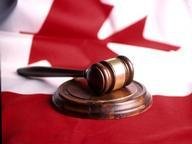Quiz Answer Key and Fun Facts
1. The nine men and women appointed to the Supreme Court of Canada were referred to as what in the past?
2. Until 1949, civil decisions of the Supreme Court of Canada could be appealed to which higher authority?
3. A Canadian jury consists of how many citizens?
4. Two legal systems operate in Canada - the Common Law System and the Civil System. Where will you find the Civil System?
5. In Canada, who prosecutes drug trafficking charges?
6. What is the last numbered section of the Criminal Code of Canada?
7. What is the maximum penalty for first degree murder in Canada?
8. The Canadian Charter of Rights and Freedoms came into effect in which year?
9. In Canadian legislature, most crimes involving youth are dealt with under what act?
10. Who establishes the laws relating to criminal justice in Canada?
Source: Author
Astraea13
This quiz was reviewed by FunTrivia editor
stedman before going online.
Any errors found in FunTrivia content are routinely corrected through our feedback system.
